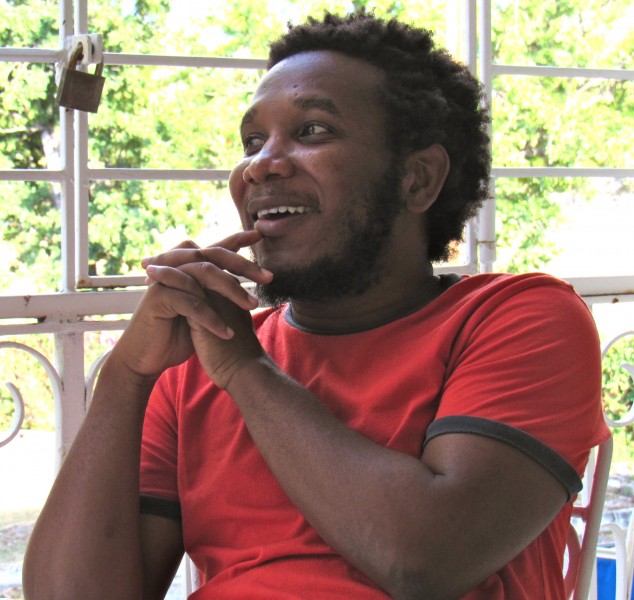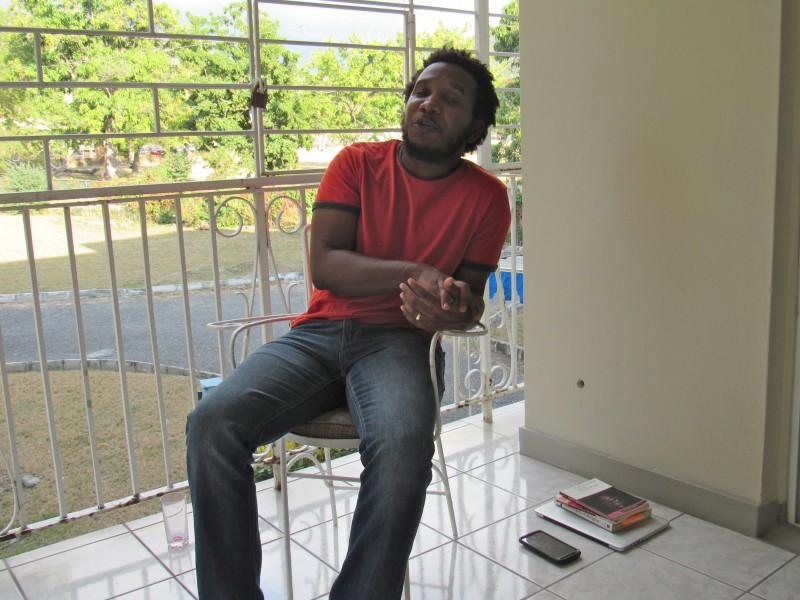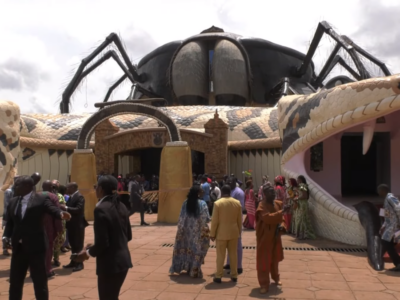
El poeta Vladimir Lucien en el Bocas Lit Fest 2015, patrocinado por la Compañía Nacional de Gas (NGC). Foto cortesía del Festival Literario Bocas, uso permitido.
Global Voices entrevistó a Vladimir Lucien, ganador del premio Bocas OCM de Literatura Caribeña 2015 con su primer libro de poesía Sounding Ground en la editorial Peepal Tree. Lucien es el primer no jamaiquino en tomar el puesto de escritor residente en el campus de la Universidad de las Antillas (UWI) en Mona. Realizó unas lecturas en el Festival del Libro de Kingston para el evento Love Affair with Literature (Idilio con la literatura) el 6 de marzo en la facultad de Humanidades junto al prestigioso escritor jamaiquino Olive Senior. Nos habló tanto de su inspiración y filosofía como de la literatura y cultura caribeña.

Vladimir Lucien; foto por Emma Lewis, uso permitido.
Global Voices (GV): Cuéntenos sobre su trabajo en Jamaica. ¿En qué ocupa su tiempo ahora?
Vladimir Lucien (VL): As the 2016 Writer in Residence, I teach a weekly Creative Writing session at the Department of Literatures in English. I just arrived in Jamaica in mid-January, and this is my first visit here, so I am getting to know the place. I am participating in a number of events, including the Kingston Book Festival [March 5 – 12], which I am looking forward to. This month there is a lot happening on campus, including the Bob Marley Lecture [presented this year by Man Booker Prize winner Marlon James]. I will also be reading at the Calabash International Literary Festival [June 3 – 6] in St. Elizabeth. That will mark the end of my time here as Writer in Residence. Ending on a high note!
Vladimir Lucien (VL): Al ser escritor residente del 2016, imparto una clase semanal de escritura creativa en inglés en el departamento de Literatura. Llegué a Jamaica a mediados de enero y esta es mi primera visita aquí. Así pues, estoy empezando a conocer el lugar. Participo en varios eventos como el Festival del Libro Kingston (del 5 al 12 de marzo) al que estoy deseando ir. El campus se llena este mes de eventos, como la lectura de Bob Marley (presentada este año por el galardonado con el premio Man Booker, Marlon James). También leeré en el Festival Literario Internacional de Calabash (del 3 al 6 de junio) en St. Elizabeth. Esto marcará el final de mis días aquí como escritor residente. ¡Terminando por lo alto!
GV: ¿Tiene tiempo para escribir?
VL: Yes, I have time to write, and this is very valuable. In fact, as soon as I arrived here I started writing a novel. It is an enjoyable experiment. Basically though, I am a storyteller. And I feel — I am almost afraid — that if I don't continue to write, it is a gift that can be taken away at any moment. For a long time, I have wanted to write a narrative. I am very much drawn to magical realism, as a way to comprehend the world we're living in. Kamau Brathwaite discussed this in his book «MR» [2002], which inspired me. By the way, I am simultaneously writing a memoir and a book on aesthetics. Writing is a project for me.
VL: Sí, y este tiempo es muy valioso. De hecho, tan pronto como llegué aquí empecé a escribir una novela. Es un experimento entretenido. Soy, sencillamente, un cuentacuentos y presiento que (casi me aterra la idea) si no sigo escribiendo, este don me puede ser arrebatado en cualquier momento. Llevo queriendo escribir un texto narrativo desde hace mucho tiempo. Me fascina el realismo mágico como medio para comprender el mundo en el que vivimos. Kamau Brathwaite lo debatió en su libro MR (2002) que me inspiró. Por cierto, también estoy escribiendo una memoria y un libro sobre estética. Escribir es un proyecto para mí.
GV: Parece que tienes un montón de proyectos. Lee mucho, ¿qué le inspira?
VL: I wanted to write prose because I have always been an avid reader of prose — Jamaican writers such as Roger Mais and Marlon James, for example. I also enjoyed reading Diana McCaulay's «Huracan.» Two novels I especially treasure are Gabriel García Márquez’ «One Hundred Years of Solitude» and George Lamming's «In the Castle of My Skin.» After I read them I was actually upset at finishing them. I found myself actually missing the characters and wanting to know what they were doing! European philosophers like Nietzsche, Foucault, Henri Bergson; and an anthropologist named Talal Asad have all influenced my thinking.
VL: Quería escribir prosa porque siempre he sido un ávido lector de prosa; escritores jamaiquinos como Roger Mais y Marlon James, por ejemplo. También disfruté Huracan de Diana McCaulay. Dos novelas que atesoro especialmente son Cien años de soledad de Gabriel García Márquez y In the castle of my skin de George Lamming. Me entristeció mucho cuando las terminé de leer. ¡Me encontré a mí mismo echando de menos a los personajes y preguntándome lo que estarían haciendo! Me han influenciado filósofos europeos como Nietzsche, Foucault, Henri Bergson y el antropólogoTalal Asad.
GV: Es un poeta, y de Santa Lucía. Por tanto, le preguntarán irremediablemente por la influencia de Derek Walcott. ¿Qué opina al respecto?
VL: In a recent blog post, I tried to answer this question — and I totally understand why people ask it. There is the great looming figure of Derek Walcott, winner of the Nobel Prize for Literature. When I first started writing poetry at the age of eighteen, I mimicked his work. But no — neither I nor other St. Lucian poets such as Kendel Hippolyte and Jane King have become carbon copies of him, nor am I now influenced by him. We respect Walcott as our heritage. We must recognize the largeness of our past, but I see myself as wanting to break it down, an iconoclast. There is an intimate circle of literati in St. Lucia; we are all different from each other, and we are all different from Walcott. He is industrious; as I wrote in my blog, he got his work done. He also made me recognize the importance of metaphor and image; and there is of course rhythm and visual imagination in his work too, that imbues St. Lucian poetry. Another St. Lucian writer, John Robert Lee, dedicated a poem to Walcott («Lusca»).
VL: En una publicación reciente, intenté responder a esta pregunta; y entiendo completamente por qué lo preguntan. Está la gran figura de Derek Walcott, ganador del Premio Nobel de Literatura. Cuando comencé a escribir poesía a los 18 años, imité su obra. Pero no; ni yo ni otros poetas santalucianos como Kendel Hippolyte o Jane King se han convertido en copias de carbón de Walcott. Tampoco estoy influenciado por el ahora. Respetamos a Walcott como parte de nuestro legado. Debemos reconocer la amplitud de nuestro pasado pero me veo a mí mismo como un iconoclasta queriendo cambiarlo por completo. Hay un círculo íntimo de literatura en Santa Lucía; todos somos diferentes y distintos de Walcott. Él es, tal como escribí en mi blog, diligente; hace su trabajo. También me hizo reconocer la importancia de la metáfora y de la imagen y está también el ritmo y la imaginación visual en su trabajo, que empapa la poesía de Santa Lucía. Otro escritor santaluciano, John Robert Lee, dedicó un poema a Walcott (Lusca).

Vladimir Lucien en su residencia del campus en la UWI de Mona. Imagen cortesía de Emma Lewis, utilizada con permiso.
GV: Es un bloguero activo. ¿Qué opina sobre el impacto de las redes sociales y los blogs sobre su escritura?
VL: I find blogging specifically to be a platform where I can write with a certain degree of abandon. Academic writing — which I am currently engaged in, alongside the novel — and even interacting with people and issues via Facebook and Twitter do not allow this freedom. With blogging there is no issue of ‘trending’ or ‘likes’ and all of that which can become a sort of measure of value. When I blog I really start with the assumption that I have no audience, but then there is a certain compulsion towards blogging on a current issue, as if I am producing my own little essays. So I use that compulsion to blog (to be part of all the online activity) while retaining the sense of privacy that the essay has, the sense of independence of vision. The other thing that it gives you is it influences the way you write, makes you write as if for an audience. So you are writing charmingly, you are writing to make your point but also to entertain. It makes a pretty interesting product at the end.
VL: Considero los blogs como plataformas específicas donde poder escribir con un cierto grado de relajación. La escritura académica (en la que estoy involucrado ahora junto con la novela) e incluso la interacción con las personas y los problemas a través de Facebook y Twitter, no permiten esta libertad. Con los blogs no existen los ‘trending’ o ‘likes’ y todo lo que pueda convertirse en una especie de medida de valores. Cuando blogueo, empiezo asumiendo que no tengo audiencia pero, entonces, surge cierto impulso de escribir sobre un tema de actualidad, como si produjese mis propios pequeños ensayos. Por tanto, utilizo esa compulsión para bloguear (para formar parte de la actividad online) mientras mantengo la sensación de privacidad que tiene un ensayo, la sensación de independencia de visión. Otra particularidad es que bloguear influencia en la forma de escribir; te hace escribir como si fuera para una audiencia. Por consiguiente, escribes con encanto para dar tu opinión pero también para entretener. Esto hace del producto final algo muy interesante.
GV: ¿Dónde está para usted el ‘hogar'? ¿Se considera mayormente un escrito santaluaciano o uno caribeño?
VL: St. Lucia is home. And so is Trinidad, where my wife comes from. So I move quite a bit between the two. But you know, there is a particular place in St. Lucia I have in mind, a town called Monchy, and it is where my mother's family comes from. I went to school there. It is a special place — my reality. Overall though, I do see myself as a Caribbean writer. I write for all the Caribbean.
VL: Santa Lucía es mi hogar y también lo es Trinidad, de donde viene mi familia. Por tanto me muevo bastante entre las dos. Pero, sabe, tengo en mente un sitio especial en Santa Lucía, la localidad de Monchy. La familia de mi madre es de allí. Fui allí al colegio. Es un lugar especial, mi realidad. Pensándolo bien, me veo como un escritor caribeño. Escribo para todos los caribeños.
GV: ¿Qué piensa de la Literatura actual caribeña?
VL: Caribbean literature nowadays is very much a mixed bag. I am concerned that Caribbean writing is being seen as a category, or a ‘brand’ — a form of cultural social capital in the world. It is a brand that makes a writer unique. I think it is several Caribbeans that we are seeing.
VL: La literatura caribeña de la actualidad es una mezcla de todo. Me preocupa que la escritura caribeña se vea como una categoría, o una ‘marca'; una forma de capital social y cultural. Es una marca que hace único al escritor. Creo que podemos ver en ella a varios caribeños.
GV: ¿Son la religión y la espiritualidad importantes para usted y su trabajo?
VL: Well, I was brought up as a Catholic, most St. Lucians are Catholic. Now, our five-year-old son is the only Christian in the house! But I am beginning to understand that there are ‘several paths to market’. I have also realized that there is a kind of neutral, amoral force that we are not in control of. It is hurricane-like — we cannot ensnare it. In my writing, I am always [trying] to work out a way to not be completely ‘in charge’. I want to move people spiritually with my writing — to create an experience that is hard to articulate — just as Machel Montano does. He knows how to move a crowd. So I would say spirituality is important to me. I would also say I am an independent thinker, and I am unapologetic about that.
VL: Bueno, me educaron como católico. La mayoría de los santalucianos son católicos. Ahora mismo, el único cristiano de la casa, ¡es nuestro hijo de 5 años! No obstante, comienzo a comprender que existen ‘varios caminos’. También me he dado cuenta que hay una especie de fuerza neutral y amoral que no podemos controlar; del tipo de los huracanes, que no podemos atrapar. Cuando escribo, siempre [intento] averiguar una forma de no ‘poseer el control por completo’. Quiero llegar a las personas espiritualmente con mi escritura; crear una experiencia difícil de explicar, como lo hace Machel Montano. Él sabe como mover a una multitud. Así que sí, diría que la espiritualidad es importante para mí. También me gustaría añadir que soy un pensador independiente y que no tengo remordimientos al respecto.






